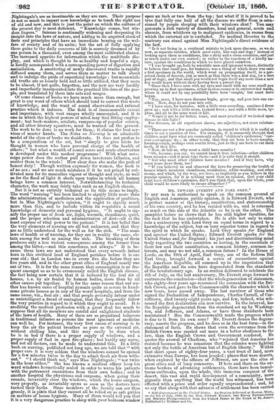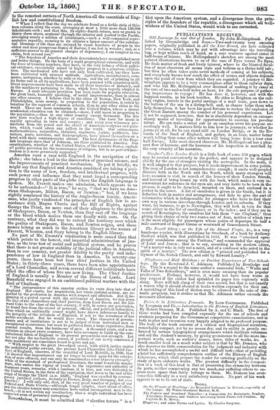MR. EDWARD EVERETT .A_ND EARL GREY. * Ir any man is
authorized to speak on the common ground of English and American public opinion it is Edward Everett, who is perfect master of the history, constitution, and. statesmanship of his own country, and he has resided with us, and is esteemed as much on this side of the Atlantic as he is on the other. The pamphlet before us shows that he has still higher faculties, for the task that he has undertaken. He is able not only to enter into a controversy with Lord Grey on equal terms in regard to a knowledge of the subject, but on very superior terms in regard to the spirit in which he speaks. Lord Grey speaks for England and against the United States ; Edward Everett speaks for the United States and for England; his just and discriminating mind truly regarding the two countries as having, in the essentials of their law and their constitution, a common history, common in- terests, and may we not add, a common future ? In the House of Lords, on the 19th of April, Earl Grey, son of the Reform Bill Earl Grey, brought forward a series of accusations against the American Republic, all summed up in the imputation that the Republic and its sons have degenerated from the standards of the revolutionary age. In an oration delivered to celebrate the 4th of July, on the last anniversary, Mr. Everett steps forward to contravene the conclusion—that the whole generation of statesmen, who eighty-four years ago renounced the connexion with the Bri- tish Crown, and gave to the Commonwealth the character which it now bears, have passed away. The last survivor of those who signed the Declaration of Independence, Charles Carroll, of Car- rolltown, died twenty-eight years ago, and few, indeed, who 'wit- nessed the first declaration can now survive. In the interval, has the Republic degenerated from the standard set up by Washing- ton, and Jefferson, and Adams, or have those standards been maintained ? Has the Commonwealth made the progress which is due to it from its own sons ? Mr. Everett denies the degene- racy, asserts the progress, and he does so in the best form—in the statement of facts. He shows that even the severance from the British Crown was carried out more in a better obedience to the law, than the English Crown and Government rendered. He quotes the avowal of Chatham, who "rejoiced that America has resisted because he was conscious that the colonies were fighting not only the battle of American but of English liberty." Within that short space of eighty-four years, a vast tract of land, more extensive than Europe, has been peopled ; places that were deserts, when explored by the officers of Jefferson, are vow the sites of great cities and of busy commerce. If here and there on the ex- treme borders of advancing settlements, there have been tumul- tuous outbreaks, upon the whole, this immense conquest of the desert, this vast and rapid development of a community, more gigantic than anything that the world has witnessed, has been effected with a peace and order equally unprecedented ; and, let us say that along with that advanse of settlement has been carried a Self-Government in the United States. An Oration delivered at Boston. Mass., on the 4th a July, 1860, by the Hon. Edward Everett, late Envoy Extraordinary and Minister Plenipotentiary from the United States at the Court of St. James. Published 1.-v Trtibner and Co. to the remotest corners of North America all the essentials of Eng- lish law and constitutional freedom.
"When I reflect that the day we celebrate found us a feeble strip of thir- teen colonies along the coast, averaging at most a little more than 150,000 inhabitants each ; and that this, its eighty-fourth return, sees us grown to thirty-three states, scatter& through the interior and pushed to the Pacific, averaging nearly a million of inhabitants,—each a well-compacted repre- sentative republic, securing to its citizens a larger amount of the substan- tial blessings of life than are enjoyed by equal numbers of people in the oldest and most prosperous States of Europe, I am lost in wonder; and, as a sufficient answer to all general charges of degeneracy, I am tempted to ex; claim, look around you.'
"The founders of America and their descendants have accomplished more and better things. On the basis of a rapid geographical extension, and with the force of teeming numbers, they have, in the very infancy of their politi- cal existence, successfully aimed at higher progress in a generous civiliza- tion. The mechanical arts have not only been cultivated, but they have been cultivated with unusual aptitude. Agriculture, manufactures, com- merce, navigation, whether by sails or steam, and the art of printing in all its forms and in all its applications, have been pursued with surprisingskill. Great improvements have been made in all these branches of industry, and in the machinery pertaining to them, which have been eagerly adopted in Europe. A more adequate provision has been made for popular education, the great basis humanly speaking, of social improvement, than in almost any other country. I believe that in the cities of Boston, New York, and Philadelphia, more money, in proportion to the population, is raised by taxation for the support of common schools, than in any other cities in the world. There are more seminaries in the United States, where a decent academical education can be obtained,—more, I still mean in proportion to the population,—than in any other country except Germany: The fine arts have reached a high degree of excellence. The taste for music is rapidly spreading in town and country ; and every year witnesses pro. ductions from the pencil and the chisel of American sculptors and pain- ters, which would adorn any gallery in the world. Our astronomers, mathematicians, naturalists, chemists, engineers, jurists, publicists, his- torians, poets, novelists, and lexicographers, have placed themselves on a level with their contemporaries abroad. The best dictionaries of the Eng- lish language since that of Johnson are those published in America. Our eonstitutions, whether of the United States, of the separate States, exclude all public provision for the maintenance of religion, but in no part of Chris- tendom is it more generously supported." America runs a race with England in the navigation of the globe ; she takes a lead in the discoveries of practical science, and the improvements of practical mechanism. To put it briefly, we might say that England and America combined are taking a posi- tion in the name of law, freedom, and intellectual progress, with such power and influence that they must impel a corresponding progress in other parts of the globe where the English language is spoken. Mr. Everett makes one admission, which appears to us to be unfounded—" It is true," he says, "that we have no Ame- rican Shakspeare Milton, Bacon, or Newton ; " but, if we have rightly construed! the history of the Anglo-Saxon family, Ameri- cans, who justly vindicated the principles of English law in ac- cordance with Magna Charts and the Bill of Rights, against George the Third, no more cast off their allegiance to the genius of Shakspeare, Bacon, or Newton, than they cast off the language or the blood which makes them one family with ours. On the contrary, what they did was to extend the territory over which the genius of Shakspeare, Bacon, and Newton reigns, and those names belong as much to the American library as the names of Everett, Wheaton, and Story belong to the English library.
No part of Mr. Everett's vindication is more sound than that which points to the honest, and impartial administration of jus- tice, as the true test of social and political system, and he proves that there is not greater stability of the judicial office in America, than in our country, not greater fidelity to the purity and inde- pendence of law in England than in America. In seventy-one years, there have been but four chief justices in the United States ; in thirty-three years, there have been nine appointments ota Lord Chancellor, and seven several different individuals have filled the office of whom five are now living. The Chief Justice of England is usually a Member of the House of Lords. Lord Mansfield was engaged in an embittered political warfare with the Earl of Chatham.
"The jurisprudence of this country strikes its roots deep into that of England. Her courts, her magistrates, her whole judicial system, are re- garded by the profession in America with respect and affection. But if, be- ginning at a period coeval with the settlement of America, we run down the line of the chancellors and chief justices, from Lord Bacon and Sir Ed- ward Coke to the close of the last century, it will, in scarce any generation, be found free from the record of personal, official, and political infirmities, from which an unfriendly censor might have drawn inferences hostile to the integrity of the tribunals of England, if not to the soundness of her public sentiment. But he would have erred. The character of govern- ments and of institutions is not to be judged of from individual men or exceptional occurrences' but must be gathered from a large experience, from
general results, from the testimony of ages. A thousand years, and a re- volution in almost every countury, have been necessary to build up the con- stitutional fabric of England to its present proportions and strength. Let her not play the uncharitable censor, if portions of our newly construct-d state machinery. are sometimes heard to grate and jar. "With respect to the great two-edged sword, with which justice mites the unfaithful public servant, the present Lord Chancellor (late Chief ms- lice) of England, observes, of the acquittal of Lord Melville, in 1806, that
'Sit showed that impeachment can no longer be relied upon for the convic- tion of state offences, and can only be considered as a test ofparty etrewth;'
while of the standard of professional literature, the same venerable magis- trate, who unites the vigour of youth to the experience and authority of fourscore years, remarks, with a candour, it is true, not very flattering to the United States, in the form of the expression, that down to the end of the reign of George the Third (A.D. 1820), England was excelled by contem- porary juridical authors, no tonly in France, Italy, and Germany, but even
America.' I will only add, that, of the very great number of judges of our Federal and State Courts,—although frugal salaries, short terms of office, and the elective tenure maysometimes have called incompetent men to the benell,—it is not within my -recollection, that a single individual has been suspected even of pecuniary corruption." Nevertheless, it must be admitted that "elective tenure" is a blot upon the American system, and a divergence from the prin- ciples of the founders of the republic, a divergence which all well- wishers of the, United States, would wish to see corrected.



























 Previous page
Previous page